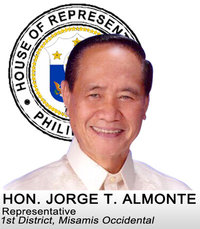House committee set to approve FOI bill
MANILA, Philippines–The public information committee of the House of Representatives is poised to approve its version of the Freedom of Information (FOI) bill, which mandates public access to all official records except in 11 instances.
Misamis Occidental Rep. Jorge Almonte, who chairs the committee, said its report on the “consensus FOI bill” drafted by the technical working group (TWG) should be ready for submission to the plenary for approval by December.
The Senate has already passed its own version of the FOI bill, which President Aquino has refused to certify urgent in spite of clamor from civil society and media organizations.
In a briefing, Almonte, who also heads the TWG, said it was crucial to thoroughly discuss the draft bill, which harmonized over 24 versions, so it would not be struck down by the Supreme Court.
11 exceptions
He said much of the discussion centered on the 11 exceptions to public access to information. “We agreed that these limitations are acceptable and necessary,” he said.
Under the draft bill, every Filipino citizen shall be given access to “any record under the control of a government agency,” including “official acts, transactions or decisions, as well as government research data used as a basis for policy development.”
Mandatory disclosure, however, does not cover “private acts, transactions or records of public officials and private individuals,” provided that their income tax returns, and statement of assets, liabilities and net worth (SALN) shall be released subject to existing law.
Under the bill, the President, Vice President, Cabinet members, members of Congress, Supreme Court justices, constitutional commissioners and generals of the Armed Forces shall be required to post copies of their SALN on the websites of their respective agencies, provided that certain private information such as street numbers of addresses, names of minor children, and the like, is stricken out.
The bill emphasizes a “legal presumption in favor of access to information,” in which any request for information may be denied only if it clearly falls under the 11 exceptions provided under it.
Burden of proof
“Accordingly, government agencies shall have the burden of proving that the information requested is exempted from disclosure,” it states.
Exceptions include classified state secrets relating to defense and national security concerns, records of minutes and advice given and opinions expressed during decision-making or policy formulation of the President, and other security-related information whose disclosure may compromise military or law enforcement operations.
Drafts of executive, administrative, regulatory and judicial orders, resolutions, decisions, memoranda or audit reports are also exempted, as well as any information obtained by any congressional committee in executive session, and privileged communications in legal proceedings.
Akbayan Rep. Barry Gutierrez said such exceptions should not be considered a watering down of the bill.
“On the contrary, the more we specify the exceptions, the clearer the framework will be,” he said.
“We spent so much time on what would constitute the exceptions, so disclosure will be maintained,” except for only specific circumstances, he said. He noted that the committee “did not create” the limitations but based their inclusion on established jurisprudence.
The draft bill also contains a provision stating that a “denial in good faith of a request for access to information” shall not constitute grounds for administrative or criminal liability.
Gutierrez explained that this was a matter for the defense, when public officers would refuse the disclosure of certain information on the belief that it was one of the exceptions provided under the law.
The bill states that the exceptions shall be “strictly construed,” and may not be invoked to cover up a crime, wrongdoing, graft or corruption.















